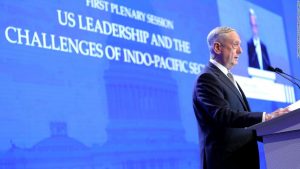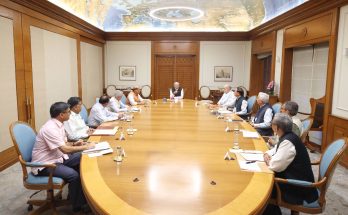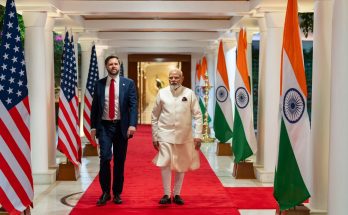
SINGAPORE: Against the backdrop of the escalating trade war between the US and China and growing concerns in the region sparked by reported militarisation of the South China Sea islands, the 18th edition of the Shangri La Dialogue, Asia’s premier security forum, will focus on shaping a free and open Indo-Pacific region.
Predictably, all eyes will be on what the two star attractions – US Acting Secretary of Defence Patrick M. Shanahan and China’s Defence Minister and State Councilor Gen. Wei Fenghe – say at the 18th Asia Security Summit on June 1 and June 2 respectively. The bilateral meeting between the defence ministers of the world’s two largest economies, who are at loggerheads with each other, will also be closely tracked in the region.
With rising tensions over competing territorial claims and China’s alleged militarisation of artificial islands in the South China Sea as a backdrop, one can expect the top US official to put China on notice about any potential aggressive adventure. Enhanced international cooperation in ensuring freedom of navigation, specially in the SCS, will feature prominently in Mr Shanahan’s speech, which will outline an updated version of the US’ Indo-Pacific policy.
Gen. Wei is, however, expected to counter these charges, reassert Beijing’s claims and reassure the international community about China’s intention to negotiate a Code of Conduct with the claimant countries in the South China Sea. Gen. Wei will speak on “China and International Security Cooperation,” an important speech that will outline China’s role in the Indo-Pacific region.
In his keynote speech on May 31, Singapore’s Prime Minister Lee Hsien Loong is also likely to articulate and reinforce ASEAN’s stated position of maintaining freedom of navigation in the South China Sea and negotiating a Code of Conduct on SCS with China.
Significantly, Gen. Wei’s participation marks the first time in almost a decade China will have sent a high-ranking official to Asia’s premier security forum.

The SLD 2019 will take place barely days after the U.S. Navy destroyer Preble sailed within 12 nautical miles of the disputed Scarborough Shoal in the South China Sea “in order to challenge excessive maritime claims and preserve access to the waterways as governed by international law,” according to Cmdr. Clay Doss, a spokesman for the Japan-based 7th Fleet. This was second time in May that a US Navy ship mounted such a challenge to China’s unilateral maritime claims.
The Trump administration, which is determined to bruise China through the ongoing trade war, is set to intensify pressure and mobilise the global community against China’s expansionist agenda in the SCS. US Republican Senator Marco Rubio and his Democratic counterpart, Senator Ben Cardin, have formally re-introduced the South China Sea and East China Sea Sanctions Act that would “impose sanctions against Chinese individuals and entities that participate in Beijing’s illegitimate activities to aggressively assert its expansive maritime and territorial claims in these disputed regions”.
The bipartisan Bill is designed to stall China’s consolidation or expansion of its claims of jurisdiction over the sea and airspace in disputed zones in the South China Sea – claimed by several ASEAN countries, including Vietnam, the Philippines and Malaysia.
In his speech at the SLD 2018, US then Defence Secretary James Mattis had detailed recent actions by China to corroborate Washington’s claims about China’s militarisation of South China Sea islands. “China’s militarization of artificial features in the South China Sea includes the deployment of anti-ship missiles, surface-to-air missiles, electronic jammers and, more recently, the landing of bomber aircraft at Woody Island,” he had said.

Promoting freedom of navigation in South China Sea and a rules-based maritime and international order figured prominently in India’s Prime Minister Narendra Modi’s keynote address at the opening of the Shangri-La Dialogue on June 1.
This year, there is no clarity yet about any high-level participation in SLD 2019 from India as a new government will take charge just a day before the security summit kicks off in Singapore. Indian officials dealing with the region, however, said that there is no change in PM Modi’s vision of a free, open and inclusive Indo-Pacific with ASEAN at its centre, as articulated at SLD 2018. With its huge stake in ensuring and promoting freedom of navigation, India is set to collaborate closely with key players in the region. Recently, India launched a dialogue with Vietnam on collaborating in the Indo-Pacific region.
India has also indicated its willingness to join friendly countries to ensure freedom of navigation in the region. Early this month, two Indian naval ships joined their counterparts from the US, Japan, and The Philippines for a “Group Sail” exercise through the contested waters of the South China Sea. This underlined India’s commitment to working with partners to ensure safe and open sea lanes, the Indian Navy has said in a statement.
Author Profile

- Manish Chand is Founder-CEO and Editor-in-Chief of India Writes Network (www.indiawrites.org) and India and World, a pioneering magazine focused on international affairs. He is CEO/Director of TGII Media Private Limited, an India-based media, publishing, research and consultancy company.
Latest entries
 India and the WorldApril 21, 20253T Template for India-US Mega Partnership
India and the WorldApril 21, 20253T Template for India-US Mega Partnership India and the WorldFebruary 14, 2025Modi-Trump COMPACT: India, US launch MEGA partnership for 21st century
India and the WorldFebruary 14, 2025Modi-Trump COMPACT: India, US launch MEGA partnership for 21st century India and the WorldJanuary 28, 2025Modi, Trump talk global peace, focus on strategic connect
India and the WorldJanuary 28, 2025Modi, Trump talk global peace, focus on strategic connect India and the WorldDecember 16, 2024Kazan Spirit: India, China SRs to hold talks in Beijing
India and the WorldDecember 16, 2024Kazan Spirit: India, China SRs to hold talks in Beijing







